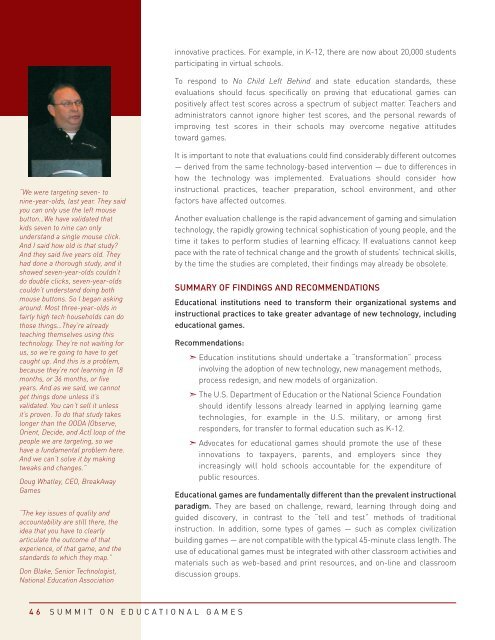Summit on Educational Games - Federation of American Scientists
Summit on Educational Games - Federation of American Scientists
Summit on Educational Games - Federation of American Scientists
You also want an ePaper? Increase the reach of your titles
YUMPU automatically turns print PDFs into web optimized ePapers that Google loves.
“We were targeting seven- to<br />
nine-year-olds, last year. They said<br />
you can <strong>on</strong>ly use the left mouse<br />
butt<strong>on</strong>…We have validated that<br />
kids seven to nine can <strong>on</strong>ly<br />
understand a single mouse click.<br />
And I said how old is that study?<br />
And they said five years old. They<br />
had d<strong>on</strong>e a thorough study, and it<br />
showed seven-year-olds couldn’t<br />
do double clicks, seven-year-olds<br />
couldn’t understand doing both<br />
mouse butt<strong>on</strong>s. So I began asking<br />
around. Most three-year-olds in<br />
fairly high tech households can do<br />
those things…They’re already<br />
teaching themselves using this<br />
technology. They’re not waiting for<br />
us, so we’re going to have to get<br />
caught up. And this is a problem,<br />
because they’re not learning in 18<br />
m<strong>on</strong>ths, or 36 m<strong>on</strong>ths, or five<br />
years. And as we said, we cannot<br />
get things d<strong>on</strong>e unless it’s<br />
validated. You can’t sell it unless<br />
it’s proven. To do that study takes<br />
l<strong>on</strong>ger than the OODA (Observe,<br />
Orient, Decide, and Act) loop <strong>of</strong> the<br />
people we are targeting, so we<br />
have a fundamental problem here.<br />
And we can’t solve it by making<br />
tweaks and changes.”<br />
Doug Whatley, CEO, BreakAway<br />
<strong>Games</strong><br />
“The key issues <strong>of</strong> quality and<br />
accountability are still there, the<br />
idea that you have to clearly<br />
articulate the outcome <strong>of</strong> that<br />
experience, <strong>of</strong> that game, and the<br />
standards to which they map.”<br />
D<strong>on</strong> Blake, Senior Technologist,<br />
Nati<strong>on</strong>al Educati<strong>on</strong> Associati<strong>on</strong><br />
innovative practices. For example, in K-12, there are now about 20,000 students<br />
participating in virtual schools.<br />
To resp<strong>on</strong>d to No Child Left Behind and state educati<strong>on</strong> standards, these<br />
evaluati<strong>on</strong>s should focus specifically <strong>on</strong> proving that educati<strong>on</strong>al games can<br />
positively affect test scores across a spectrum <strong>of</strong> subject matter. Teachers and<br />
administrators cannot ignore higher test scores, and the pers<strong>on</strong>al rewards <strong>of</strong><br />
improving test scores in their schools may overcome negative attitudes<br />
toward games.<br />
It is important to note that evaluati<strong>on</strong>s could find c<strong>on</strong>siderably different outcomes<br />
— derived from the same technology-based interventi<strong>on</strong> — due to differences in<br />
how the technology was implemented. Evaluati<strong>on</strong>s should c<strong>on</strong>sider how<br />
instructi<strong>on</strong>al practices, teacher preparati<strong>on</strong>, school envir<strong>on</strong>ment, and other<br />
factors have affected outcomes.<br />
Another evaluati<strong>on</strong> challenge is the rapid advancement <strong>of</strong> gaming and simulati<strong>on</strong><br />
technology, the rapidly growing technical sophisticati<strong>on</strong> <strong>of</strong> young people, and the<br />
time it takes to perform studies <strong>of</strong> learning efficacy. If evaluati<strong>on</strong>s cannot keep<br />
pace with the rate <strong>of</strong> technical change and the growth <strong>of</strong> students’ technical skills,<br />
by the time the studies are completed, their findings may already be obsolete.<br />
SUMMARY OF FINDINGS AND RECOMMENDATIONS<br />
Educati<strong>on</strong>al instituti<strong>on</strong>s need to transform their organizati<strong>on</strong>al systems and<br />
instructi<strong>on</strong>al practices to take greater advantage <strong>of</strong> new technology, including<br />
educati<strong>on</strong>al games.<br />
Recommendati<strong>on</strong>s:<br />
46 SUMMIT ON EDUCATIONAL GAMES<br />
➣ Educati<strong>on</strong> instituti<strong>on</strong>s should undertake a “transformati<strong>on</strong>” process<br />
involving the adopti<strong>on</strong> <strong>of</strong> new technology, new management methods,<br />
process redesign, and new models <strong>of</strong> organizati<strong>on</strong>.<br />
➣ The U.S. Department <strong>of</strong> Educati<strong>on</strong> or the Nati<strong>on</strong>al Science Foundati<strong>on</strong><br />
should identify less<strong>on</strong>s already learned in applying learning game<br />
technologies, for example in the U.S. military, or am<strong>on</strong>g first<br />
resp<strong>on</strong>ders, for transfer to formal educati<strong>on</strong> such as K-12.<br />
➣ Advocates for educati<strong>on</strong>al games should promote the use <strong>of</strong> these<br />
innovati<strong>on</strong>s to taxpayers, parents, and employers since they<br />
increasingly will hold schools accountable for the expenditure <strong>of</strong><br />
public resources.<br />
Educati<strong>on</strong>al games are fundamentally different than the prevalent instructi<strong>on</strong>al<br />
paradigm. They are based <strong>on</strong> challenge, reward, learning through doing and<br />
guided discovery, in c<strong>on</strong>trast to the “tell and test” methods <strong>of</strong> traditi<strong>on</strong>al<br />
instructi<strong>on</strong>. In additi<strong>on</strong>, some types <strong>of</strong> games — such as complex civilizati<strong>on</strong><br />
building games — are not compatible with the typical 45-minute class length. The<br />
use <strong>of</strong> educati<strong>on</strong>al games must be integrated with other classroom activities and<br />
materials such as web-based and print resources, and <strong>on</strong>-line and classroom<br />
discussi<strong>on</strong> groups.
















